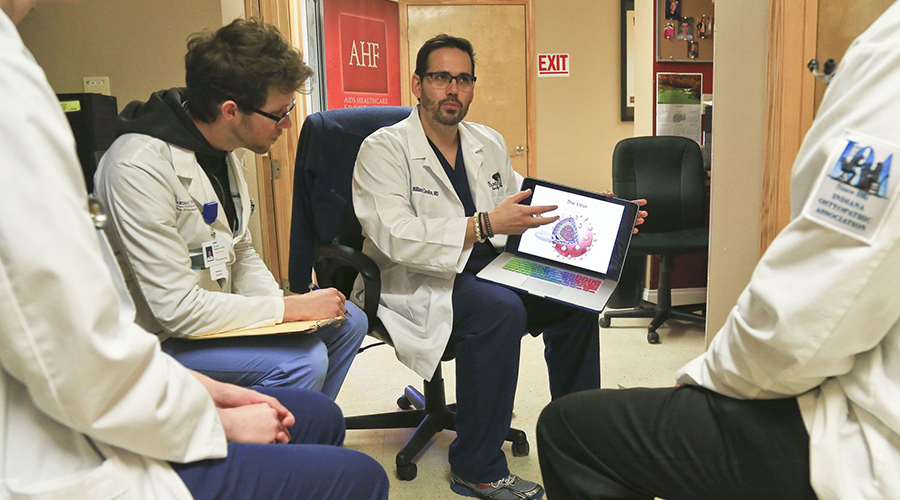Dr. William Cooke, Facility Medical Director (FMD), at Scott Memorial Hospital in Scottsburg, Indiana, part of the LifePoint Group, saw a problem in his community about 15 years ago.
In 2004, he opened a medical office in neighboring Austin, Indiana, called Foundations Family Medicine. Prior to this clinic, there had not been accessible healthcare in the community since the 1970s, and he saw the repercussions firsthand. “It was really like third-world mission work,” he said.
Austin is home to approximately 4,300 people, and Dr. Cooke explained many of these citizens lived with deeply problematic social determinants of health, such as poor living conditions, toxic stress, generational trauma and lack social services. These factors, coupled with lack of social services and healthcare access, directly contributed to chronic diseases, widespread opioid addiction and an increasing number of HIV/AIDs cases. In fact, in 2015, HIV outbreak in Austin was the largest drug-related HIV outbreak in U.S. history, and the incident of HIV was higher than any country in sub-Saharan Africa.
The community is right off interstate 65, and pill mills run along the highway. Addiction to prescription drugs, opioids and pain killers and eventually heroin and meth manifested, and there was little access to mental health and substance abuse services.
So Dr. Cooke decided to get to the root of the problem. “I believe we went into healthcare to treat a person, not a disease,” Dr. Cooke said. “We wanted to break an inter-generational cycle that has been rooted in this area for decades.”
Dr. Cooke wanted to build a system that could take a holistic approach to patient care. He formed a collaborative team of community partners, such as school systems, local government and law enforcement, and created access points for those needing substance abuse support, like their healthcare provider, emergency department, recovery groups and integration programs for those leaving jail. These access points directed those suffering from addiction to Dr. Cooke and his clinical team to give them tools for recovery. “Often people don’t access care because of the stigma,” he said. “The criminalization of these issues causes them to hide from doctors and the other people who can help them.”
His team also created a mobile unit to meet people right where they are. The mobile unit allows for residents to receive testing, and it provides a community health nurse and recovery nurse on site. Through a county-wide coalition, recovery coaching has been implemented, and Scott County (home of both Austin and Scottsburg, Indiana) now contains more trained recovery coaches than any other county in the state. “With this support, we are getting to see people take pride in their recovery and maintain it,” he said. The number of people in recovery in the community has increased by 1,000%, and the number of Hepatitis C cases has decreased by 76%.
Dr. Cooke and his team also began working to raise awareness about HIV/AIDs, and TeamHealth was able to support his team in expanding their services. Since his team’s work began, they have reduced cases of HIV by 95%, going from 200 cases in the first year to only approximately seven new cases per year.
The work Dr. Cooke and his team are doing is usually not reimbursed through the current fee-for-service system. “This prevents providers in other communities to do work like this,” he said. “We work with the Indiana State Department of Health, the Health Foundation of Greater Indianapolis and the AIDS Healthcare Foundation. Without public health funding for this sort of care, it isn’t possible to provide.”
You can read more here about Dr. Cooke recently receiving the Pillar of Excellence Award by Addiction Policy Forum.
To learn more about how TeamHealth supports their clinicians so they can provide outstanding patient care, visit our Why TeamHealth site. Are you ready to join a team that supports you and recognizes your impact in providing excellent patient care? TeamHealth has opportunities available nationwide!
